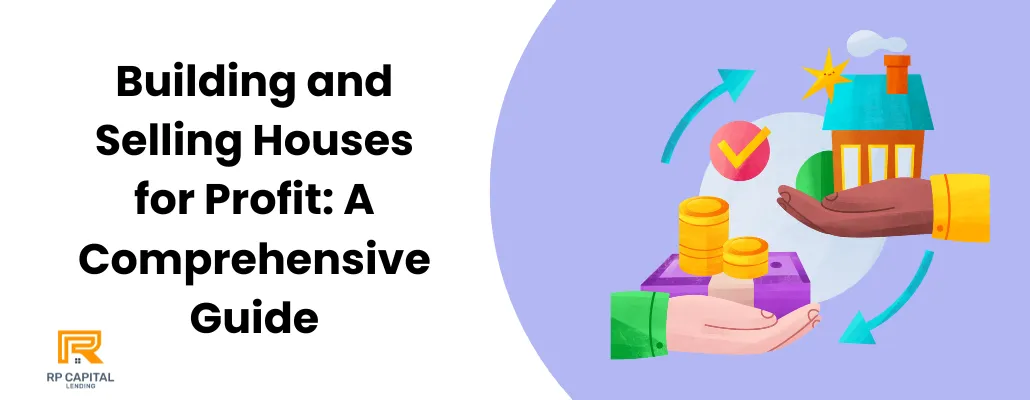Blog

Building and Selling Houses for Profit: A Comprehensive Guide
Building and selling houses for profit is an increasingly popular venture, blending expertise in real estate with a flair for design and finance. Success in this field requires understanding market trends, customer preferences, and effective project management. It's not just about constructing a house; it's about creating a home that appeals to buyers both aesthetically and functionally. This venture can be highly rewarding, but it also demands careful planning, market research, and a strategic approach to every aspect of the building and selling process.
Understanding the Market: Trends and Demands
The real estate market is a complex and ever-evolving entity, influenced by many factors including economic conditions, demographic shifts, and cultural trends. A successful builder and seller must stay informed about these changes, anticipating shifts in demand and adjusting strategies accordingly.
Understanding what buyers want, from energy-efficient homes to smart technology integration, and aligning these preferences with current market conditions is crucial. This knowledge not only helps in creating desirable properties but also in timing the market for sales to maximize profit.
Finding the Right Location
Location is paramount in real estate. A perfect location balances accessibility, amenities, and potential for appreciation. It's about more than just the plot of land; it's about the community, the schools, the local economy, and future development plans. The right location can drastically increase a property's value and appeal. Researching and selecting the right location requires an understanding of the local real estate market trends, the socio-economic profile of potential buyers, and the long-term prospects of the area.
Planning and Designing: Meeting Market Needs
Effective planning and design are crucial in creating properties that not only meet market demands but also stand out in the competitive real estate market. This involves more than just aesthetic appeal; it's about functionality, efficiency, and adaptability.
Designs should cater to the target market's lifestyle and preferences, whether it's open-plan living spaces for families or high-tech features for young professionals. Balancing aesthetics with practicality, while also considering construction costs and sustainability, is key to successful property development.
The Financial Aspect: Budgeting and Financing
The financial planning of a building project is as important as its physical construction. Budgeting accurately involves considering all costs—land acquisition, construction, labor, materials, and unexpected expenses.
It also means navigating through financing options, be it bank loans, investments, or partnerships, to fund the project effectively. A well-planned budget ensures that the project remains financially viable throughout its lifecycle, from inception to sale, thereby maximizing profits and minimizing financial risks.
The Construction Process: Steps and Tips
The construction process is a critical phase where plans and designs come to life. This stage requires meticulous planning and coordination. Choosing the right contractors, ensuring quality materials, and adhering to a strict timeline are essential.
Effective communication and management during this phase prevent delays and cost overruns. It's also important to be adaptable and prepared for unexpected challenges that may arise during construction.
Legal and Regulatory Considerations
Understanding and adhering to legal and regulatory requirements is vital in the building and selling process. This includes zoning laws, building codes, environmental regulations, and obtaining the necessary permits.
Failure to comply with these regulations can lead to legal complications, delays, and additional costs. Being well-versed in these legal aspects not only ensures a smooth construction process but also instills confidence in potential buyers regarding the legality and safety of the property.
Marketing Your Property Effectively
Marketing is key to attracting buyers and closing sales. In today’s digital age, an effective marketing strategy often involves a combination of traditional methods and digital platforms, including social media, real estate websites, and virtual tours.
Marketing should highlight the unique features of the property, its location, and other selling points. An effective marketing campaign reaches the right audience, creates interest, and ultimately drives sales.
Negotiation and Sales: Closing the Deal
The art of negotiation is central to finalizing a sale. It involves not just setting the right price but also understanding the buyer's perspective, being flexible, and finding a mutually beneficial agreement.
Effective communication skills, knowledge of the market, and a bit of psychology go a long way in successful negotiations. Closing a deal also requires an understanding of legal procedures, paperwork, and ensuring a smooth transition of ownership.
Post-Sale: Evaluating the Project
After a sale, it’s important to evaluate the project's success. This involves analyzing what went well and identifying areas for improvement. Reflection on aspects like budgeting accuracy, construction efficiency, and marketing effectiveness can provide valuable insights. This evaluation is crucial for continuous improvement and success in future projects.
Risks and Challenges in House Building and Selling
This venture comes with its share of risks and challenges, including market fluctuations, financial risks, construction delays, and regulatory hurdles. Understanding these risks, planning for contingencies, and being adaptable can help mitigate them. It's also important to stay informed about market trends and economic factors that can impact the real estate sector.
Sustainability and Eco-Friendly Practices
Incorporating sustainable and eco-friendly practices in building projects is becoming increasingly important. This not only reduces the environmental impact but also appeals to a growing segment of environmentally conscious buyers. Sustainable practices include energy-efficient designs, use of green materials, and water conservation techniques. These practices can enhance the property’s value and appeal, while also contributing to a healthier environment.
Leveraging Technology in Construction and Sales
Technology plays a crucial role in modern construction and sales processes. From building information modeling (BIM) for efficient design and construction management to virtual reality (VR) for immersive property showings, technology can streamline processes and enhance the buyer's experience. Leveraging these technological advancements can lead to cost savings, improved efficiency, and a competitive edge in the market.
The Future of House Building and Selling
The future of building and selling houses is shaped by trends like smart home technology, sustainable building practices, and changing buyer demographics. Staying ahead in this dynamic field requires continuous learning, adaptation, and innovation. Understanding and anticipating these future trends can provide a significant advantage in planning and executing successful real estate projects.
Conclusion: Building a Profitable Business in Real Estate
Building and selling houses for profit is a challenging yet rewarding endeavor. It requires a combination of market knowledge, strategic planning, financial acumen, and adaptability. With the right approach, it offers the potential for substantial rewards. Success in this venture comes from understanding the market, meeting buyer needs, managing risks, and continuously adapting to changing trends.
FAQs
1. What are the key factors in selecting a location for building houses?
Key factors in selecting a location include local market trends, accessibility, amenities, and future development plans.
2. How do I create a budget for a house-building project?
To create a budget, factor in material costs, labor, permits, unexpected expenses, and financing options.
3. What legal considerations should I be aware of in house building and selling?
Legal considerations include zoning laws, building codes, permits, and property regulations.
4. How can I effectively market my property for sale?
Effective property marketing involves using digital platforms, innovative strategies, and understanding target demographics.
5. What are the future trends in the real estate market for builders and sellers?
Future real estate trends include sustainable building practices, technological integration, and adapting to changing market demands.
RP Capital Lending is a d.b.a of RP Capital Partners Inc (NMLS # 2469193) | Privacy Policy
Copyright © 2022. All Rights Reserved.
Disclaimer: Loans only apply to non-owner occupied properties. Rates, terms and conditions offered only to qualified borrowers, may vary upon loan product, deal structure, other applicable considerations, and are subject to change at any time without notice.

